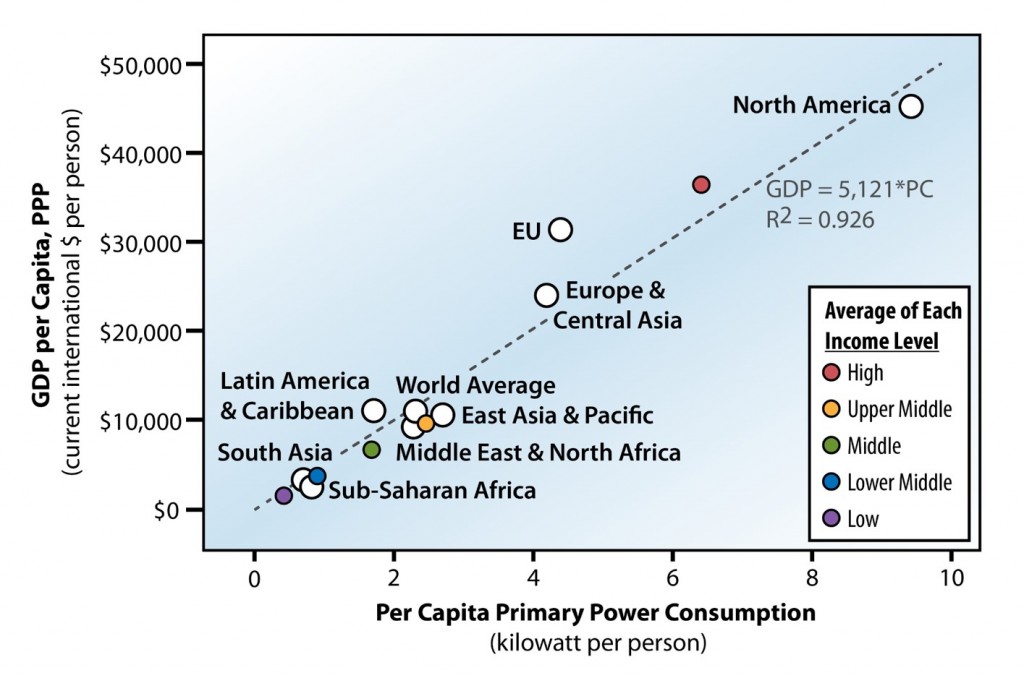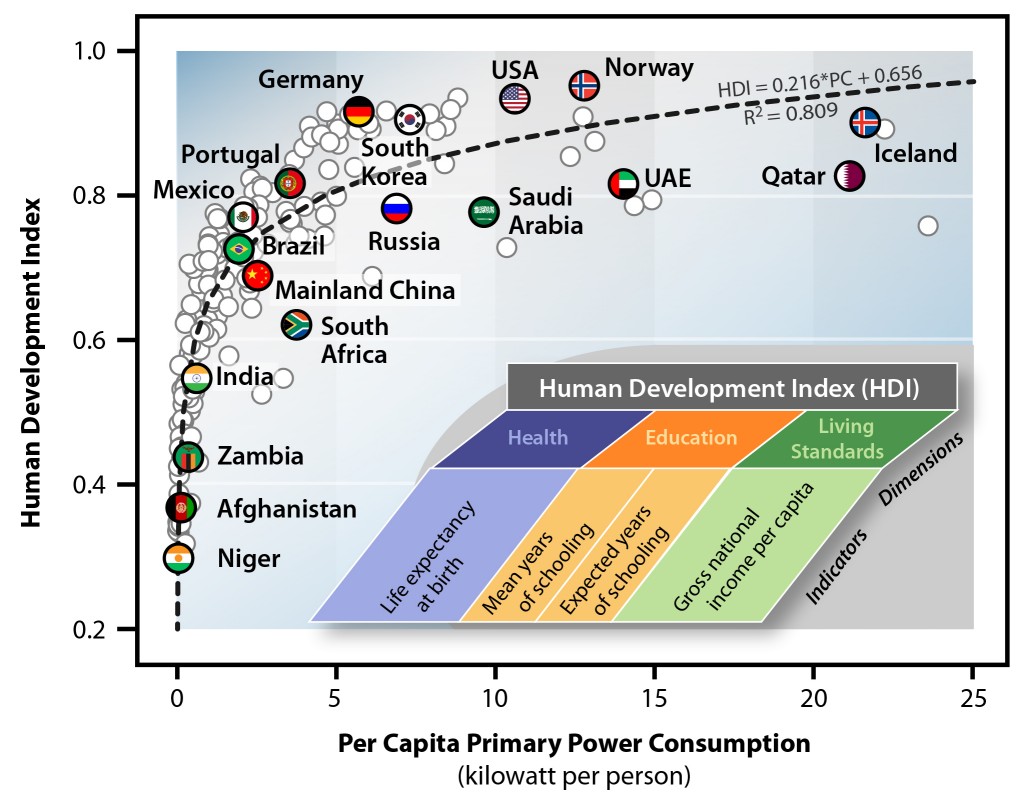Human well-being is a direct function of power consumed, or the rate at which work is done. The relationship between rate of energy consumption and rate of wealth production should not surprise anyone. The faster work is done (more power consumed), the more wealth that is produced. It is impossible to think of a single wealth-producing activity that does not require work—the expenditure of energy. The great increase in the world’s wealth since the Industrial Revolution is the obvious outcome of using fossil fuels to provide the energy for machines to do work. We got rich in the last couple of centuries in large measure because we used so much fossil energy. If we are not able to maintain high-energy consumption rates, the data summarized below strongly suggest that we will get poorer, sicker and less educated.
About 93% of the variation in per capita wealth production (GDP per capita) between different countries can be explained simply by how fast they use energy—the power they consume—as seen in Figure 1.
A broader measure of human well being than just wealth includes the Human Development Index (HDI), a composite measure of expected life span, expected years of schooling and wealth. Figure 2 shows that HDI rises rapidly with increased power consumption and levels off at about 2-4 kilowatts (kW) per capita. Apparently we need about 2-4 kW per capita to achieve good levels of health, education and wealth.
The numbers are sobering. If everyone on the planet were to consume 2 kW of power, we would need about 14 terawatts overall…roughly the current world power use. If everyone were to obtain a more comfortable life using 4 kW instead of 2 kW, the total world power consumption would need to double. Where would that energy come from? Approximately 85% of current world energy use is from fossil fuels: coal, oil and natural gas. These are non-renewable resources. When they are exhausted, the wealth they produce will likewise disappear.
Peak (cheap) oil arrived in 2005. Peak coal and peak natural gas are yet to come, but they will come simply because they are not renewable. Peaking and decline of non-renewable resources is not a matter of politics or economics or philosophy, it is a matter of physics and geology. Thus very large-scale renewable energy systems are not just a “good idea”; they are essential. If we do not implement large-scale renewable energy systems now, we can count on being poorer, much poorer, in the future.


Dr. Dale, The theory seems rational albeit academic. However, the discussion of “peak” oil, coal, gas, etc. is flawed. “Peak Energy” has been predicted over and over again for decades,… Read more »
Quite right. Moreover, while fossil fuels probably will become more expensive in the long run — and already impose other, undesirable costs — if by “renewable energy” Dale means solar,… Read more »
Lewis, I read the Physics Today article and followed up a bit on the related stories. Maybe there is something there, but we will not know for sure until a… Read more »
Bruce, we have gone back and forth about your peak oil arguments multiple times. I think we are now well into the “agree to disagree” stage. As you suggest, it… Read more »
Excellent observations and wise analysis, Mr. Shortt. I have been in renewable energy since 1981 (!) and can attest to the Gloom and Doom theories about when we will run… Read more »
America and the world needs electricity, that is a fact. Renewable energy is coming, but we will still be needing our fossil fueled power plants for many decades yet. Power… Read more »
Lest we forget: 1. “The peak of [U.S.] production will soon be passed—possibly within three years.” 2.“It will take only another 50 years or so to use up the great… Read more »
The problem is not that we will run out of fossil fuels, the problem is that we won’t. Climate scientists tell us that we can’t burn more than 20% of… Read more »
Peter, Many good points, thank you. I agree that government-directed crash programs are likely to be wasteful and even self-defeating. But given the very long transition times between energy systems,… Read more »
Bruce: Your comments throughout have been thoughtful and gracious, and I’m pleased to participate in a conversation that has the positive tone that you have set. I am for a… Read more »
I am especially sympathetic to Dr. Bruce Dale’s posting and also the follow up by Dr Grossman. While we need to look at and develop the alternatives , yes, but… Read more »
Here is a nice article from Business Week that points out that CA’s rules change in the 70’s under Jerry Brown changed your equation. http://www.businessweek.com/articles/2014-09-09/u-dot-s-dot-may-not-be-leading-on-climate-but-california-is “Passed in 2006, Assembly Bill… Read more »
OurEnergyPolicy: California’s economy and per-capita GDP are in perilous decline. From 2000 to 2013, California added one job for every 11 new residents. It is the only state this side… Read more »
YIKES! My point was that growth in GDP and the amount of energy used no longer move in tandem …..Are you suggesting that CA’s climate has been dramatically changed since… Read more »
Jane, Please don’t try to distract with a strawman (although it would be ironic to hear you argue against climate change in California). You seem to be defending a quote… Read more »
Ike, Good Heavens! “California wins when it’s grid goes dark”? What I said was that CA changed their ratemaking policy to not make rates dependent on the amount of energy… Read more »
What Dr. Dale has included in his brief post is excellent context for a discussion of the energy needs of civilization, but is necessarily incomplete. Just looking at the huge… Read more »
I had hoped to elicit more input on the relationship between power consumption and wealth, although it is always entertaining to bash California. 🙂 If you accept that there is… Read more »
Bruce, I thought I did respond to your question about the linkage between wealth and power consumption in some detail. Let me be more direct and quantitative. From one of… Read more »
Hi Ike: Thanks for your direct response about the relationship between energy and wealth. I am reading the Garrett papers. They appear to be well-grounded in fact. However, I do… Read more »
1. Autrotrophic, not heterotrophic. 2. Please give examples of hyperbole. 3. It is only natural that liquid hydrocarbons should be priced higher than solid and gas hydrocarbons because they are… Read more »
Dear Captain Kiefer (and Mr. Loving to some extent): I suspect we are not going to be any closer to agreement when I have finished this post, but I thought… Read more »
Bruce, I certainly agree with your 2 thoughts … we need to use energy more efficiently and we must have terawatts of renewable energy if “future inhabitants of the planet… Read more »
Thank you, Jane. Good comments on the importance of building energy efficiency. One of my concerns is that we have this enormous built environment that is dispersed all over the… Read more »
Bruce, to respond directly to your points: 1) We are rich because we consume a lot of energy, about 16 terawatt globally. Agreed – and that number will only keep… Read more »
Thank you, Dawn. I perhaps over stated (see below) that you agree with me about the need to develop renewables. What you said was that you thought we needed to… Read more »
Dr. Dale: You have offered an interesting, albeit incomplete analysis of the “relationship between energy consumption, wealth production, and human well being.” What your analysis has done, is it has… Read more »
Thank you, Jim, for your comments. I appreciate the reading list. The link to Gail Tverberg’s work is particularly useful. I will read them all. You made the connection between… Read more »
I thank everyone for their comments. It looks like this thread may have reached its endpoint. It has been five days since the last comment on my request for a… Read more »
Bruce, I missed this thread when it was posted, but want to say that I concur with very nearly eveything you have said. To avoid the highly uncertain, but very… Read more »
Dr. Dale: Thanks for your reply. I think the Breakthrough Energy I am discussing is not yet validated. To discover/achieve/exploit it requires a “Manhattan Project or Apollo Project” type research… Read more »
Mr. Loving: As I explain in Chapter 6 of my book, U.S. Energy Policy and the Pursuit of Failure (Cambridge U. Press 2013), the Apollo Program and the Manhattan Project… Read more »
Mr. Grossman: While I have not read your book, just skimmed your Cato paper, several of your articles, and reviews of your book, we can agree on a few things.… Read more »